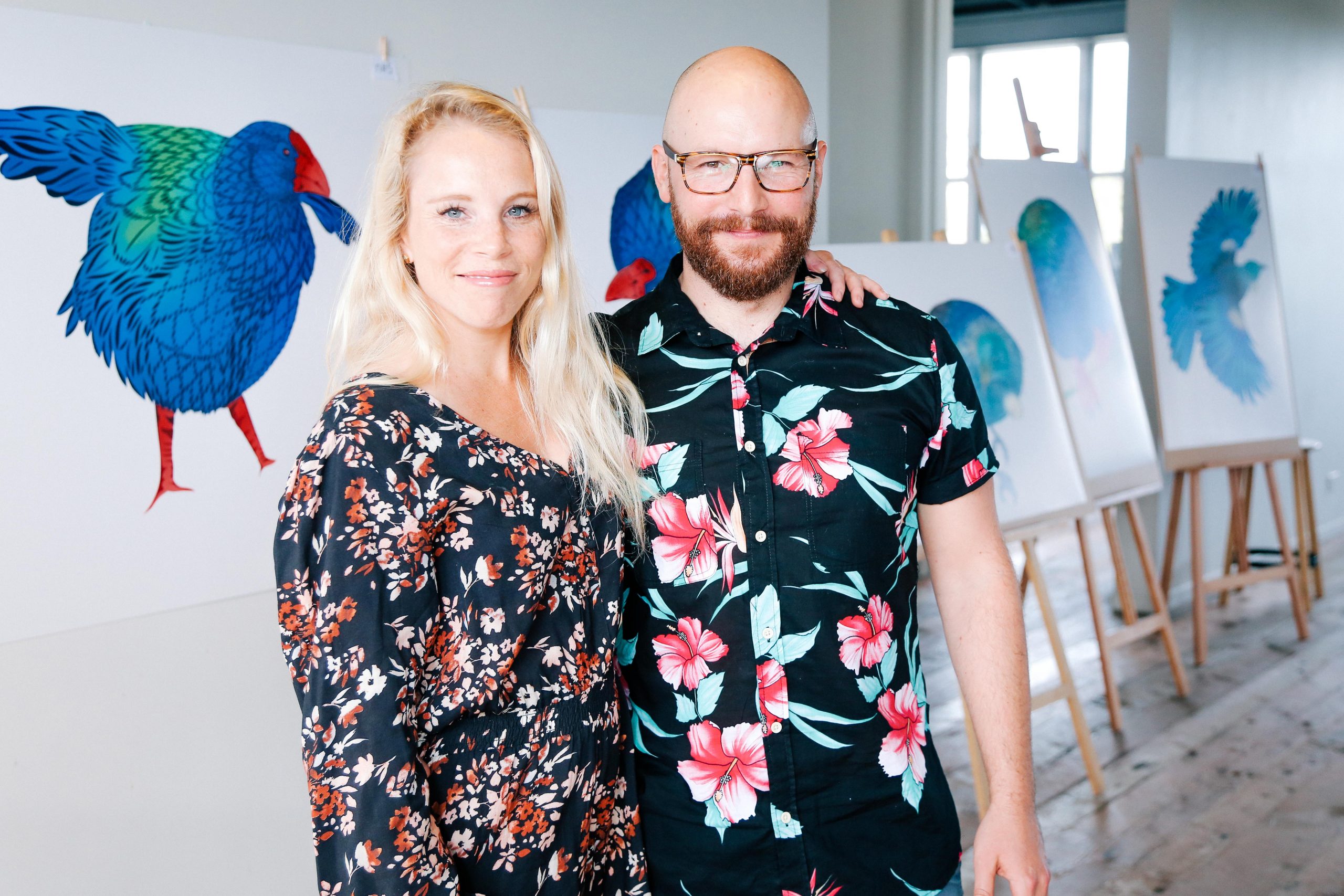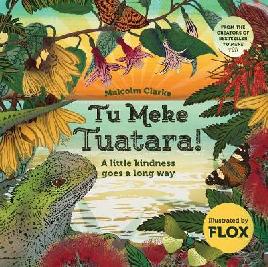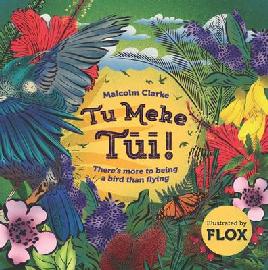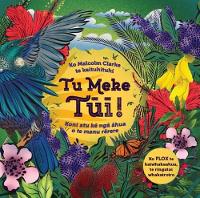Missbeecrafty interviews Malcolm Clarke and Flox, the author-illustrator duo who have just published Tu Meke Tuatara!, and earlier wrote the award-winning Tu Meke Tūī. Tu Meke Tuatara! is a story about showing kindness, empathy and friendship, as well as doing your bit to save the environment.
Missbeecrafy: Tu Meke Tūī! and Tu Meke Tuatara! are such beautiful and vibrant books, they really stand out on the shelves! What is it like seeing your book in a shop for the first time?
Malcolm:
It sounds a bit silly, but I’m always surprised when I walk into a shop and see our books on the shelf. The distribution is all taken care of by our amazing publishers, Little Love, so I’m one step removed from that process. I was in a mall with some friends not so long ago and we saw Tu Meke Tuatara! in a gift shop. My friends tried to embarrass me by pointing me out to the shop attendants, but it was actually just validating to hear that the books were selling well!
Flox:
I’m so proud of our mahi on these books. I do get a little jolt of excitement when I’ve seen Tu Meke Tūī! and Tu Meke Tuatara! out in the world. What’s even cooler is when I’ve been running workshops with tamariki and they’re already familiar with the book. I love seeing the delight on the kids faces when they realise that I’m the illustrator.
Tu Meke Tuatara! is not only beautiful to look at, the message of the story is beautiful too. What sparked the ideas that lead you to this story?
Malcolm:
In the book, Tahi the Tuatara is down in the dumps. We don’t use the word ‘depression’, but we do understand that he’s feeling blue. His friend Roger the Ruru tries to cheer him up, but it’s not until they both help out a friend that Tahi begins to feel a little better. I’ve had many friends over the years struggle with depression. We never set out to solve this issue with the book, but I really wanted to model kindness for young readers and try to provide a platform for further discussion. The messaging is clear - sometimes we get sad, and we don’t know why. However, when we help someone else, it can help to make us feel better.
I enjoyed Roger the Ruru’s Kiwi-as way of talking! Is there anything you can tell us about the creation of your characters?
Malcolm:
This is why I love the process of collaboration so much! There are a few lines that Roger the Ruru has in the book that are quintessentially Antipodean, but a favourite is ‘Bummer bro!’, which the editor, Kimberley Davis, suggested. I always saw Roger with a lot of Kiwi flavour, and the process of editing the manuscript with Kimberley helped to develop that further. It’s difficult in such a short story to create complex and unique characters, but I think Kimberley was excellent at enhancing this!
The two of you had already worked together on Tu Meke Tūī!. How did you find the collaborative process? Was it different this time around?
Flox:
We learned so much making Tu Meke Tūī! that our process was more refined with Tu Meke Tuatara! Everyone has their traditional roles, but we all collaborate to make the best looking book. The major difference with Tu Meke Tuatara! was that I was about to start the illustrations when the pandemic hit. This was a huge shock, but I was actually really grateful for the time and space to sink into the artwork. I used this as an opportunity to evolve my creative process by making some of the backgrounds digitally rather than with spray paint and stencils. Working digitally saved a huge amount of time, but it also provided the platform for more creative play and I think the illustrations benefit from this.
Your artworks are often on a huge scale, Flox, like a mural on the side of a two storey building. How is it different working on picture book scale artwork?
Flox:
The main difference with creating images for the book is that the pictures really have to tell a specific story. I love creating murals and they’re often influenced by a story or geography but they’re not quite as literal as children’s book illustrations. One thing I love about Tu Meke Tuatara! is the visual poetry that enhances the world Malcolm conceptualised. Tahi’s journey from feeling down to making new friends is reflected in every aspect of the artwork. The best example of this is how we see the dark and brooding skies in the backgrounds transitioning into full joyful colour in the final spread. There are hundreds of other characters and interesting things in the pages that our young readers can discover.
Your artworks are so intricate! I know you cut your stencils by hand, which is such a labour of love. How long does it take to create these illustrations?
Flox:
Every stencil is different. Every images requires a different amount of time. I think with the first mock up of Tahi, it took about four and a half hours to draw, cut and paint. Stencilling for me is a meditation and I love seeing the evolution of the characters as they appear when I’m cutting. It can be really hard on my body, leaning over the desk and working with really fine detail, but over the years I have refined this process and I’m really trying hard to find a balance and work smarter.
What are your workspaces like? What things do you like to have around you to help you get in the zone?
Flox:
In my studio at home I have artwork from other artists, and lots of plants! I love the greenery. I live on the city fringe, so having natural light and flora around me is essential! I have to admit, I find it really hard to start work without having coffee, so there’s always a fresh pot brewing in the morning.
Malcolm:
There’s no regularity when it comes to creating a workspace. Sometimes I take my laptop to a local cafe and tap away for an hour or so. Other times, I’ll write propped up on pillows in bed or at the dining table. What a lot of people don’t realise is only a small percentage of the story happens with a pen and paper or tapping on a keyboard. For me, the story manifests while I’m walking out in nature, talking to friends, or meditating on the premise.
Where do you draw your inspiration from?
Malcolm:
Definitely from our native wildlife. We have such diverse and interesting flora and fauna in New Zealand, and I love celebrating that through children's books. The main reason I want to make these books is to provide a platform to model my core values - kindness, creativity and conservation. These values are my driving force and inspiration for anything I create.
Flox:
I have to agree. One of my favourite things about creating the work that I do is learning about all the wonderful creatures and plants we have in New Zealand. Just about every character featured in the book is referenced in a visual glossary in the back pages. I love learning the names of all of the birds, bugs and plants that live here with us in Aotearoa.
I haven’t had a chance to see the stage show of Tu Meke Tūī, but the promo looks pretty amazing. Are there plans to develop Tu Meke Tuatara for stage as well?
Malcolm:
Yes! We were thrilled to be able to offer the stage show as an extension of our story, and there are some early plans being made to adapt Tu Meke Tuatara! as well. We have a tour of Tu Meke Tūī! coming up in 2021 in partnership with The Performing Arts Network of New Zealand (PANNZ) and we’ll be working towards the creation of a stage show version of Tu Meke Tuatara! at the same time.
Malcolm, you work for TV as well as writing books for kids. How do these two different paths complement each other?
Malcolm:
I work as an editor for entertainment television - shows like Love Island, America’s Got Talent and The Voice. Over the years, working on these shows has refined my story-telling ability. As as editor, you are often involved in helping to ‘write’ the narrative using existing material. I’ve always found those skills easily translate when I’m creating the stories for my children’s books.
You’ve worked on some really popular shows! I have to ask, have you had any fanboy moments working on these shows? Have you met any of your idols?
Malcolm:
I love working on these popular shows! Everyone involved in the process of creating them is extremely talented and dedicated. As an editor, we aren’t often in the same space as the celebrities, but I have met a few in my time working in entertainment TV. Tom Jones and Will.I.Am are incredible humans with great minds. I accidentally spilled my drink on one of the Xfactor UK finalists at a wrap party, which was only slightly traumatising ... But I saw them at an event a few years later and we laughed about it!
This year has been a crazy one! What challenges and opportunities has this year brought for you both?
Malcolm:
I was working in Los Angeles when Covid hit in March. The company I was working for made plans for us to work at home, and I was just grateful to still be working! I was originally planning to move more fluidly between New Zealand and America, though, as my boyfriend lives here in Auckland. It ended up at that we were apart for seven months. We both found this challenging, but we managed to find our way though it by lots of FaceTime dates. On top of the pandemic, there were Black Lives Matter protests right outside my apartment. The resonance of the pain and hurt people experienced was really present. This movement and the struggles were at the forefront of everyone's minds. I worked hard to focus on my job and keep in contact with family and friends, many that I haven't heard from in a long time. I was very isolated, but thanks to technology, I didn’t feel lonely.
Flox:
In hindsight I am really proud of how New Zealand handled the pandemic, and now we have this amazing sense of normality. A lot of my work outside of Auckland had to be rescheduled during this time, but on the whole I think having the time and space to be with my kids and stay still for a while was very restorative. I feel grateful for all the opportunities that 2020 has presented for me and my artwork, but I know it’s been a huge shift for a lot of people. I’ll definitely be looking out for my friends and family over the festive season, and I’ll be checking in with people to make sure everyone is doing ok.
Are there any stories that you read as children that have really stuck with you? Can you tell us about your favourite books?
Malcolm:
Hairy Maclary, by Lynley Dodd, is iconic with memorable characters and great rhymes too. “Scarface Claw, the toughest tom in town” was the inspiration for Stan the Sly Stoat in Tu Meke Tūī! A.A. Milne’s Winnie the Pooh will always evoke a strong sense of nostalgia for me with its magical and heartfelt stories and strong characters. Margaret Mahy’s Bubble Trouble is the most hilarious tongue twister and a simple but genius story. Just try reading Bubble Trouble to a young one after a glass of wine - it’s hilarious!
What do you hope kids reading your books will take away from them?
Flox:
I hope we get to see it on the shelves for a long time and that people resonate with the images and the story. My son, Indi, is obsessed with the Tuatara. The book is dedicated to him and he loves it! Tuatara are the last survivors of an order of reptiles that thrived in the age of the dinosaurs. It’s totally mind blowing that this species has existed for more than 200 million years, and they’re in New Zealand! Tuatara deserve some props!
Malcolm:
I firmly believe that if we create positive memories around nature with our tamariki, they will be much more likely to look after the environment in the future. Children learn from literature. It’s the perfect format to help teach positive values. Be kind, look after your friends and the environment. Not only will you help the people around you, but it’s likely you’ll feel better about yourself, too. We need more empathy in the world right now, for each other and for Papatūānuku.








Add a comment to: Kindness, creativity and conservation – an interview with Malcolm Clarke and FLOX